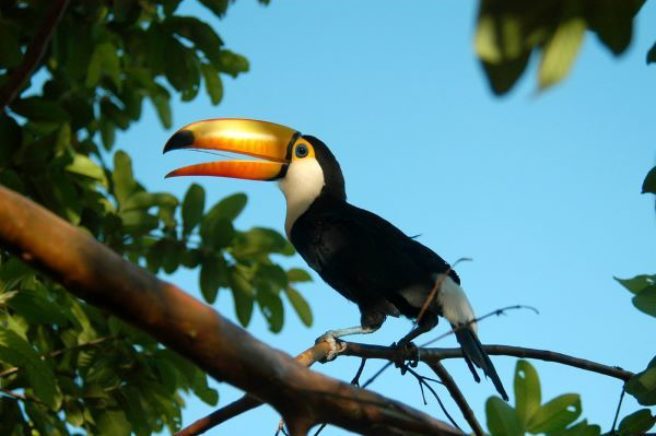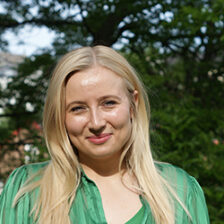Interested candidates should send their application clearly indicating how they meet the above ‘Requirements of the evaluators’, including application letter, proposed methodology, budget, availability timewise to undertake the work and relevant resumes, to tender@wwf.no by 16.00 hrs Oslo time on 21st February 2025.
Tender: Final Evaluation of WWF-Norway's Tropical Forest (NICFI) Portfolio 2021-25
WWF is seeking a consultancy firm/consultant to produce a final evaluation of the four programmes and the overall portfolio under the WWF-Norway "Sustaining tropical forests for Climate, Nature and People” grant portfolio.

Background
This Terms of Reference (ToR) is for a final evaluation of the four programmes and the overall portfolio under the WWF-Norway "Sustaining tropical forests for Climate, Nature and People” grant portfolio. Through this programme portfolio, WWF-Norway supports the development of sustainable commodity and finance markets in Brazil, China, Colombia and Norway with an aim of halting deforestation and conversion in the Congo Basin, Amazon and Cerrado.
The portfolio is supported by funds from the Norwegian International Forests and Climate Initiative (NICFI) through Norad and totals approximately NOK 100 million. The overall purpose of NICFI’s support is to reduce and reverse the loss of tropical forests and in turn contribute to a stable climate, the protection of biodiversity, and sustainable development.
In 2021, WWF-Norway received a grant from Norad to work on the programme portfolio. WWF-Norway originally aimed to achieve three programme outcomes before the end of the programme implementation phase, but had to revise to two portfolio outcomes as a programme in the Democratic Republic of the Congo was phased out:
- Outcome 2: By 2025, key commodity and financial markets stimulate deforestation-free production in tropical forest in Brazil, Colombia and DRC.
- Outcome 3: By 2025, all programme elements incorporate Climate Smart and Inclusive Conservation, and awareness is raised in Norway on DCF issues, solutions and results.
The programme underwent a mid-term review in 2023. As per WWF-Norway and WWF Network standards a final evaluation of the programme portfolio is required.
Purpose and objectives
The main purpose of the final evaluation is to provide WWF and stakeholders with an independent assessment of a) the four programmes against their outcome and impact targets, and b) the programme portfolio, against the outcome and impact targets in the overall results framework, focusing on impacts achieved by the programmes and the portfolio and identifying lessons learned.
The evaluation will be carried out against the set targets and three of the OECD DAC criteria for evaluation1, which will enable a clear assessment of the programme's achievements and potential legacy. Typically, that means Effectiveness, Impact and Sustainability, as per the rational below:
- Effectiveness: This criterion is fundamental in determining whether the programme achieved its intended objectives. It provides a measure of the programme’s success by examining if it delivered the expected outcomes and made progress toward the primary goals. In a final evaluation, effectiveness offers a clear picture of the program’s accomplishments.
- Impact: Impact is crucial because it assesses the broader, often long-term, effects of the programme on the target groups and beyond. This criterion helps identify unintended consequences (both positive and negative) and broader changes that the programme may have catalysed. Understanding impact is essential to gauge the program's lasting influence on development challenges.
- Sustainability: As the programme concludes, sustainability becomes especially important. It examines whether the programme’s benefits are likely to endure over time, even without continued support. A final evaluation that emphasizes sustainability can reveal the programme’s potential for lasting change and its likelihood of building self-reliant systems or capacities within the target groups or sector.
These three criteria combined give a comprehensive view of the programme's immediate success, its long-term impact, and its potential for continued influence, making them the most valuable for this final evaluation. The other three OECD DAC criteria will not be assessed in the final evaluation, as they have been reviewed previously in the mid-term evaluations and the findings are largely still valid.
As such, the specific objectives of the final evaluation are to:
- Assess the four individual country outcomes and impact against the following three OECD DAC criteria for evaluation – 1) Effectiveness, 2) Impact and 3) Sustainability and make recommendations relevant for future similar programmes
- Assess the overall portfolio outcomes and impact against the following three OECD DAC criteria for evaluation – 1) Effectiveness, 2) Impact and 3) Sustainability and make recommendations relevant for future portfolios of this nature.
- Assess the extent to which cross-cutting issues (gender equality, human rights, environment and climate, anti-corruption), have been factored into and influenced programme implementation and identify any specific positive or negative impacts related to these.
- Building upon the analysis in the Mid-Term Review (MTR), analyse how WWF-Norway and partner WWF offices managed the rapid changes during the implementation period, including Covid and others changes relevant either at programme level or across several programmes, as well as adjustments implemented since the MTR. What learnings for future work can be identified?
- Assess the added value and related costs of WWF-Norway and the WWF Network, i.e. in addition to the role of the implementing offices to the achievements of the portfolio, and how this could be further enhanced in the future.
- Identify key lessons learned and recommend ways to promote future application of these.
- Address a limited set of specific questions that each of five individual programmes may wish to add to their specific programme-level evaluations.
The key users and target audience for this final evaluation report are the WWF-Norway programme advisors and managers, the partner WWF offices who have lead implementation, programme stakeholders and Norad. The final report will be included as a basis for analysis in WWF Norway’s NICFI Grant portfolio final results report, and it will feed into future work undertaken by WWF-Norway and partner WWF offices.
Download:
Full terms of reference
Read the full terms of reference here:
Mode of application
Interested candidates should send their application clearly indicating how they meet the above ‘Requirements of the evaluators’, including application letter, proposed methodology, budget, availability timewise to undertake the work and relevant resumes, to tender@wwf.no by 16.00 hrs Oslo time on 21st February 2025.
Interested candidates can email questions for clarification to Steven McQueen (smcqueen@wwf.no) and Inger Karoline Hovstein (ihovstein@wwf.no), and a written response will be provided, which will also be shared publicly on a Q&A on this web page.
Q&A
What is the budget for this procurement?
There is no official estimated budget for this assignment.
Where is the consultant required to travel?
Travel is required to Brazil, China and Colombia. Travel to Norway is not expected but can be included.
What presentations are required?
One PowerPoint presentation summarising the methodology and approach taken, the evaluation findings, conclusion, recommendations and lessons learned across the programme portfolio
Can alterations be made to the timeline outlined in the ToR?
You can submit adjustments to the time frame, duration and form of the working days (travel, review etc), the outline in the ToR is indicative only. A request may be made by WWF-Norway to alter the financial proposal/time frame to align with the ToR if additional costs are not considered necessary.
How should travel arrangements be organized and included in the financial proposal?
Travel arrangements will need to be made by the consultant(s) and travel costs should be included in the financial proposal. WWF partner offices and WWF-Norway will support and facilitate for interaction between the consultant(s) and relevant staff/stakeholders.
Can the date of final delivery be adjusted?
It is preferred the assignment will be concluded by 15th August, but we can consider minor adjustments to the deadline.
Should external sources be included in the literature review?
Only internal programme and portfolio documentation is required to be reviewed
What currency should the proposal be in?
Norwegian Kroner (NOK) is preferred but other currencies (USD, EUR, GBP) will also be considered. Our intention is for the contract to be based on NOK.
Are WWF-Norway looking to recruit an individual consultant or a team?
We will consider applications from both individuals and teams of consultants.
If a team of consultants is hired how would this affect the working days outlined in the ToR?
The ToR provides an indicative overview of the number of days for an individual to complete the assignment. If a team of consultants is proposed, we would expect the working days to be divided between the team of consultants. This division of working days should be described in the proposal.
Should the financial proposal be submitted in a particular form?
There is no form/template required by WWF-Norway. WWF-Norway would recommend the consultant to provide a breakdown of costs indicating cost per day per consultant, overall days worked per consultant, travel costs and other fees/expenses.
Should presentation of findings be factored into the 40 working days? Or should that be budgeted separately?
The working days outlined in the ToR are indicative only and you are free to include additional days for the presentation of findings. A request may be made by WWF-Norway to alter the financial proposal/time frame to align with the ToR if additional costs are not considered necessary.
Are field visits expected to include only WWF headquarters and stakeholder meetings, or should they also involve site visits to specific projects in the field?
Travel will be required to the following cities: Bogota, Brasilia and Beijing, with travel to Shanghai and Sao Paolo being optional. No site visits to specific projects are required
Are there any key stakeholders that you expect the consultant(s) to engage with beyond WWF offices and Norad?
Yes, this can include government representatives, companies, finance institutions, trade associations and civil society organizations. This should not involve additional travel, and where necessary interviews can be conducted virtually.
The TOR mention four programmes in one place and five programmes in another: What is the correct number?
The portfolio currently consists of 4 programmes. A programme in DRC was originally included in the portfolio but was terminated in 2023. The DRC programme will not be evaluated in this evaluation.
Is it possible to receive access to the 'existing information sources' outlined in the ToR?
These will be shared with the consultant once they have been hired.
Do you have a list of members/employees of private and finance sector actors and trade associations that are targeted by WWF-Norway and partners under the NICFI grant you would like us to survey or are you expecting us to come up with them?
These will be shared with the consultant once they have been hired. Stakeholders will include government representatives, companies, finance institutions, trade associations and civil society organizations. This should not involve additional travel, and where necessary interviews can be conducted virtually.
Would it be possible for WWF-Norway to book standard accommodations directly and issue flight tickets through their usual in-house travel agency according to their prevailing travel guidelines?
The consultant(s) will be expected to organize their own travel arrangements.
What guidelines does WWF-Norway follow on per diems, overnight accommodation and flight class?
The consultant(s) is not expected to follow WWF-Norway's guidelines for travel and should propose a cost estimate they believe to be reasonable. A request may be made by WWF-Norway to alter the financial proposal on travel if certain costs are deemed excessive.
For further questions, please contact

Steven McQueen
Leder for internasjonalt naturvern og utvikling

Inger Karoline Vanvik Hovstein
Seniorrådgiver, måling, evaluering og læring